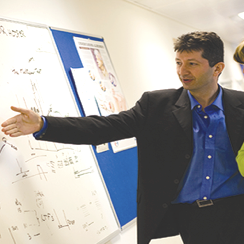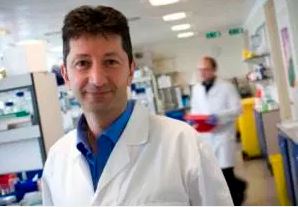 Project MinE researcher Ammar Al-Chalabi has been rewarded with the prestigious Sheila Essey Award for his role in research of the complex genetic causes of ALS/MND. The prize acknowledges his important role in Project MinE, the worldwide collaborative research to find the genetic causes of ALS/ MND.
Project MinE researcher Ammar Al-Chalabi has been rewarded with the prestigious Sheila Essey Award for his role in research of the complex genetic causes of ALS/MND. The prize acknowledges his important role in Project MinE, the worldwide collaborative research to find the genetic causes of ALS/ MND.
Al-Chalabi and his team have helped to identify many of the known ALS genes and are now completing two of the largest ALS genetic studies ever. In a UK based study, researchers are examining 17 million gene variations in 40,000 people. In the international Project MinE, researchers are sequencing entire genomes of more than 20,000 people. “Finding the genetic causes of ALS will help researchers understand the reasons motor neurons degenerate, identify the environmental and lifestyle risk factors and allow doctors to design personalized treatments,” said Al-Chalabi.
While it was once thought that ALS was a simple disease with no genetic basis, except in those with a family history, it is now known to be a complex condition in which genetics combine with non-genetic factors, causing degeneration of motor neurons.

Al-Chalabi is Professor of Complex Genetics and director of the MND Care and Research Centre at King’s College London.
“It is a wonderful acknowledgement of the work the present and past members of my team have done in ALS/MND research,” Prof Al-Chalabi said.
The Sheila Essey Award is jointly given by the American Academy of Neurology (AAN) and the American ALS Association, and recognises an individual who has made significant research contributions in the search for the cause and cure for ALS/ MND. The prize was awarded at the AAN research conference in Vancouver, Canada, with 12,000 attendees.
In 2011 the Sheila Essey Award was awarded to another important Project MinE researcher, Prof. Leonard van den Berg of the ALS Centre Netherlands, as an acknowledgement of his role in international collaborative research projects, such as Project MinE.
Read the full story on the MND Associations research blog and the press release of the AAN.